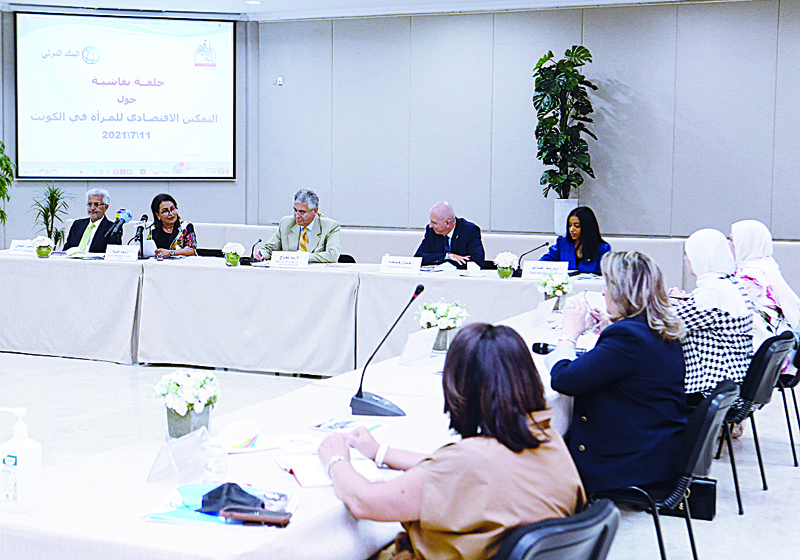 KUWAIT: Participants attend a panel discussion on 'Economic Empowerment of Women in Kuwait' at the Women's Cultural Social Society on Sunday. - Photo by Yasser Al-Zayyat
KUWAIT: Participants attend a panel discussion on 'Economic Empowerment of Women in Kuwait' at the Women's Cultural Social Society on Sunday. - Photo by Yasser Al-ZayyatBy Nawara Fattahova
KUWAIT: The social culture of working women should change in Arab countries to empower women to reach the same economic level as men, a number of experts have agreed. Specialists in various fields have reached that conclusion during a discussion panel on 'Economic Empowerment of Women in Kuwait', held on Sunday at the Women's Cultural Social Society (WCSS).
Lulwa Al-Mulla, Chairperson of WCSS, said that woman's participation in development will improve the life of both men and women. "The economic empowerment and gender equality promote economic growth. This was also emphasized in the fifth Sustainable Development Goal for 2030," she said.
Farid Belhaj, World Bank Vice President for Middle East and North Africa, noted that the subject of this panel is important not only for Kuwait but also for the Middle East. "Women empowerment is important in all aspects, including economic, social and political. Women's empowerment is one of the priorities on our agenda at the World Bank. We always support women," he pointed out.
Challenges facing women
Dr Lubna Al-Qadhi, Head of the Women Research Center at Kuwait University, stressed the Kuwaiti woman is well-educated and qualified in all fields, but faces many challenges, so she should be allowed to work in any field. "Economic empowerment will lead to social empowerment. Women only constitute 15 percent of decision-making positions in the public sector and 18 percent in the private sector. We noticed the interest of private companies in this issue, but we need to modify the labor law," she said.
Dr Reem Al-Rdeini, Head of the Feminist and Gender Studies Unit at Kuwait University, explained we need to change the masculine culture in our community. "Vacancies should be filled equally from both genders according to the applicant's qualification and not based on gender. The solution should start with changing the curriculum, which is the beginning of educating the community. Research has shown that only 2 percent of decision-making positions are occupied by women in GCC countries, except Bahrain, where it is 14 percent. Also in self-employed positions, only one percent are women," she explained.
Discrimination against women
Dr Maha Al-Baghli, member of the Municipal Council and Founder of Safira Company, said: "Based on statistics, there is discrimination against women in the workplace, especially in leading positions. I see the solution in providing awareness programs that start from the school years. I also think that the political leadership should support women in getting an equal chance to be in decision-making positions and political positions, including the parliament and Cabinet."
Dr Mirza Hasan, Executive Director, Gender Policy at the World Bank, said based on experience, women achieved better results in many fields or projects including education, agriculture and water. "At the World Bank, we work on empowering genders. The bank is working on evidence studies in 189 countries on the benefits of empowering women. By empowering women, it returns on the economy. Developed countries have achieved better growth when enrolling women in the labor market. We share the global experience about women empowerment," he pointed out.




